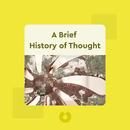A Brief History of Thought: A Philosophical Guide to Living
Your highlights:
Stoicism attempted to explain the functioning of the universe and humankind’s place within it.
From the Stoic perspective, ethics was fairly straightforward. That is, whatever went against the cosmic order was wrong and bad, and whatever acted in harmony with it was right and good. To be an ethical person, in turn, you had to act in accordance with the order of things and fulfill the duties of your assigned place – whatever that order or place might be. Of course, from a modern perspective, this idea has some troubling social and political implications. For example, according to the Stoics, if you were born a slave, this was your rightful place in the cosmic order, and your task was to accept it.
30 August, 2019 08:26
Share
The scientific revolution unleashed systems of thought that led to modern philosophy.
Descartes took the doubt unleashed by the scientific revolution and molded it into a tool for philosophical inquiry. In a search for irrefutable truth, Descartes examined reality by adopting a position of radical skepticism and critical thinking. In doing so, he invented an attitude crucial to modern philosophy: the critical spirit. And, to examine reality, Descartes used the idea of tabula rasa – a clean slate. He would reject all prior beliefs and assumptions and start his inquiries afresh.
30 August, 2019 08:33
Share
But humanists also need a version of salvation. To achieve this, some turned to religions of earthly salvation – pseudo-religions centered on human beings, rather than god(s). Things like communism, scientism and patriotism are all religions of earthly salvation, promising us utopias. To their adherents, they give meaning to human existence by providing objectives that are supposedly more important than a single individual’s life.
30 August, 2019 08:33
Share
Immanuel Kant took up Rousseau's humanism and applied it to ethics.
For Kant, a truly ethical – a truly human – action requires us to ignore our egotistical impulses and adopt an attitude of disinterestedness. We need to work toward this in our everyday life – and choose to do so freely. If we are forced to act, the ethical aspect of the action is invalidated.
30 August, 2019 08:34
Share
By directing our actions toward a common good, we use our freedom of choice to make disinterested decisions that benefit the welfare of humanity. In doing this, we distance ourselves from our primitive, egotistical impulses and become closer to humanity as a whole.
30 August, 2019 08:34
Share
Friedrich Nietzsche dismantled humanism and ushered in the age of postmodern philosophy.
Nietzsche spent his life trying to expose the futility of nihilism. To that end, his philosophy insists that there are no utopias or values that give meaning to life. Instead, the meaning of life is life itself! In other words, life doesn’t depend on something else – something superior to it – to give it meaning; rather, life gives meaning to itself. Also, Nietzsche saw the world as comprising of two different forces: reactive and active. What’s more, these forces were chaotic and always in conflict – the world could never be reduced to the Greek ideas of harmony.
30 August, 2019 08:37
Share
If we can teach our active and reactive forces to cooperate, we live life intensely and fully – no longer torn apart by our reactive forces of regret and self-doubt. Nietzsche called the attainment of this the grand style – his version of salvation.
30 August, 2019 08:39
Share
Contemporary humanism offers a way past the cynicism of postmodernism.
We know a matchbox has six sides, but when we hold it up to our eyes, no matter how we hold it, we can only ever see three sides at once. This is also true for reality, in that whichever angle we view life from, there are sides to it we can’t see at the moment, some of which are transcendental. The presence of something always implies an absence of something else – however we contemplate reality, we can never totally grasp it. In this way, transcendence isn’t an abstract ideal like in classical humanism – it becomes a proven fact, a very part of the reality in which we live. We can call this transcendence here-and-now.
30 August, 2019 08:40
Share
About the book:
A Brief History of Thought (1996) chronicles the big moments in the history of Western philosophy in a lucid and accessible way – from the Stoicism of classical Greece right through to twentieth-century postmodernism. Not simply a description of abstract ideals, it shows how we can apply the wisdom of the world’s best thinkers to live happier and more meaningful lives.
About the author:
Dr. Luc Ferry is a French philosopher and prolific author, whose books include On Love: A Philosophy for the Twenty-First Century (2012) and The New Ecological Order (1992). Between 1996 and 2011 he was Professor of Philosophy at Paris Diderot University, and from 2002 until 2004 was Minister of Education for the French government.







